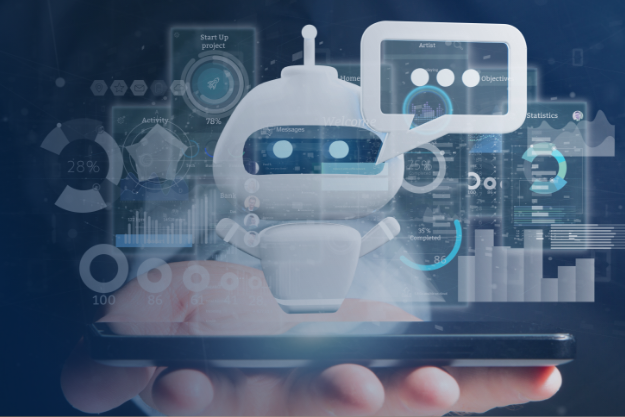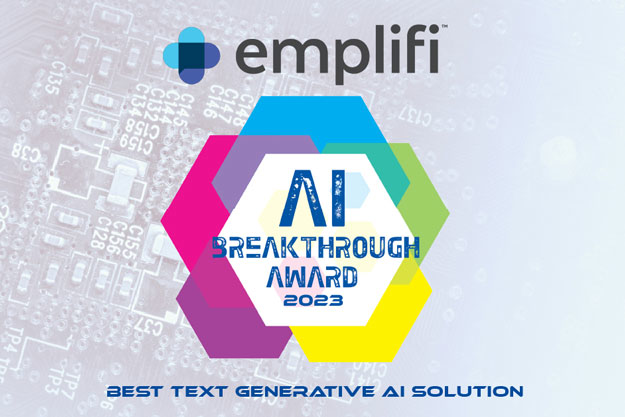There is significant pressure on today’s brands to be human and authentic. As it turns out, help might come from a decidedly non-human place.
It might feel counterintuitive, but the rise of artificial intelligence tools like ChatGPT has given marketers a way to increase authenticity across their customer journey.
There’s little doubt that AI marketing technologies can increase productivity for your brand as, according to a Gartner: "By 2025, organizations that use AI across the marketing function will shift 75% of their staff’s operations from production to more strategic activities."
And as marketing roles shift and evolve, the North Star for most brands is unlikely to move, as according to an Emplifi survey (conducted by Harris Interactive), modern consumers crave authentic brand experiences and consider it a key factor within their buying decisions.
How can the robots make your brand a bit more human? First, it’s time to stop thinking about the current generation of AI as robots – and visualizing it as an endless sea of Michelangelo’s The Creation of Adam homages.
AI is, effectively, an operating system for your marketing tactics. These tools will serve as an assistant and strategic advisor to elevate authenticity across your brand’s customer journey. Let’s explore how AI can help your brand remain authentically human.

How to humanize AI in brand marketing
The intersection of AI and marketing is data. While it’s fun – and typically very efficient – to utilize generative AI to produce social copy, drafts of emails, or even fake Wes Anderson movies, these tools are extremely valuable to analyze vast amounts of data, which can actually include a review of your own content.
Inevitably, AI will play a role in the tactical development of brand copy, but its ability to produce real-time analysis of customer behavior, preferences, and sentiment is invaluable for helping brands connect with customers on a personal level. The more you understand a customer, the more targeted and personalized your customer experience.
So, as every tactic should start with a strategy, your journey with an AI marketing technology partner should start with a goal and a review of available data to inform how you utilize it for these brand touchpoints, as each is an opportunity for an authentic customer interaction.
1. Use AI for personalization
A key part of connecting to customers is understanding them. By adopting personalization and tailoring messages to individual customers, brands will feel more authentic, and most importantly, shoppers are demanding it.
According to McKinsey & Company, 71% of consumers expect personalized interactions with brands, and 76% indicated frustration when it doesn’t happen. Here’s where your friendly neighborhood AI can support both analysis and execution.
AI can help analyze customer behaviors – reviewed with a human perspective – and then produce the content at scale, based on those insights, required for a successful personalization program.
Those consumer insights and how you communicate to them are only part of the process. It would feel inauthentic if those personalized messages were delivered in a way that smelled of spam bot and didn’t incorporate your brand voice.
Keep the nuances of human versus machine-generated language in mind, as there are subtleties of context and syntax that won't sound right if not “humanized.” AI could struggle to exactly match your brand voice, so remember to use it as your north star for how you can authentically communicate as your brand.
Your brand identity still matters and is part of why customers engage with you. How you remain distinct in voice, personality, and values is pivotal to two-way communication and connection when utilizing AI to support personalization.
2. Utilize AI chatbots to provide customer support
No one likes spam bots, and even evaluating their actual numbers on most channels is a challenge. However, their much cooler and polite cousin, the chatbot, is a helpful tool in your playbook to provide customers with instant support, answer common questions, and resolve issues.
Chatbots allow brands to build a system to streamline questions and guide customers to quick and accessible answers. AI-powered chatbots can manage repetitive, focused questions to free up time for human agents on your customer service or care teams. The more you understand your customers, the more personalized and tailored the chatbots can be to quickly manage most issues and free up human-to-human interaction when needed.
Customers need to understand who and what they’re talking to and how their data and responses are being used. All customers, particularly those with accessibility challenges, appreciate quick answers to their questions. Chatbots offer a way to blend authentic customer series and care with AI-driven tools.
3. Identify trends through AI analysis
Whether it's for thought leadership or brand protection, AI can identify opportunities and trends that would take marketers considerably more time to collect, assess, and react to without a digital partner.
AI can analyze large amounts of data to identify trends in customer behavior, which allows brands to move faster in reacting to these opportunities. If that research translates to actual content creation, it’s important to closely review sources, potential bias, and plagiarism – as each would harm your brand’s perceived authenticity.
Again, as customer connection is significantly helped through understanding, AI can help your team stay ahead of shifts and trends that affect the people you seek to engage.
4. Optimize content through AI feedback and review
If you’re looking for an impartial critic, platforms like ChatGPT or its alternatives are here to serve. Generative AI is a helpful partner in content development, but it also thrives on the analysis of your copy.
Here you can treat the interaction like a conversation, asking AI to review, recap, and rate elements of your content development. Did your content achieve its goal? Does anything require additional context? Could you be more succinct? Can this content be more conversational? What would make your copy more authentic?
Generative AI is effectively someone to gain feedback and consider new approaches to your content. It can keep you focused on the message while having a partner analyze the form, what types of content perform best with your audience, and confirm your work will resonate with customers.
5. Develop streamlined processes with AI
Perhaps the greatest key to AI helping your brand remain human is how it helps the humans that are part of your brand. According to a Stanford and MIT study, workers utilizing AI saw a 14% increase in productivity – and workers who work with generative AI tools will replace those who don’t use it, meaning AI isn’t coming for your job. Instead, it’s your partner, and ready for small talk around the water cooler.
AI will only become more essential in our day-to-day roles across data collection, analysis, and execution. But in particular, it offers a chance to focus on deeper insights and spur more time for creativity. With tools like automation and Emplifi’s AI Composer, your team can automate or develop efficiencies across many processes.
This allows more time to focus on creating authentic messaging, engaging with customers on a personal level, or, if you’re the NFL, sinking considerable creative energy – or just a few minutes on a street corner – in fairly mundane activities like the annual schedule release.
The point is your people will be capable of more with AI-powered technology, and if your organization’s focus is on authenticity, good work will follow.
What’s most important to maintain authenticity with AI?
As AI becomes more robust across the marketing process, it’s important to keep its role in the customer journey as human as possible to maintain authenticity with your audience.
Transparency is key and, where possible, AI should enhance human interaction and not fully replace it. Also, AI-generated content will benefit from blending with personalized messages and user-generated content.
Most importantly, it’s key to always monitor and refine your process. Test, iterate, test, refine, and test again. Customer feedback should continually feed adjustments to improve performance and maintain an authentic journey.

Get started with AI in your customer journey
Emplifi offers AI-powered products to help your brand remain authentic and keep pace with the modern consumer. Speak with one of our Emplifi experts today to begin utilizing AI across your customer journey.

































